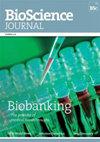乙醇酸对牙本质结构、牙本质与牙根结合强度的影响
IF 0.6
4区 农林科学
Q3 AGRICULTURE, MULTIDISCIPLINARY
引用次数: 0
摘要
本研究评估了与乙醇酸(GA)相关的超声激活(US)对涂抹层、牙本质结构和填充/修复材料与根牙本质的结合强度(BS)的影响。根用于抗菌活性、牙本质结构和BS评估,根据冲洗方案分为七组:G1:DW+US;G2:17%EDTA;G3:QMix;G4:17%GA;G5:17%EDTA+US;G6:QMix+US;G7:17%GA+US。进行扫描电子显微镜、透射电子显微镜和推出,并对每个评估进行具体的统计分析。涂抹层去除率最高的是第6组和第7组(p0.05),充填材料和修复材料的BS最高的分别出现在第6组、第7组和第5组、第6组与第7组,两者相似(p>0.05)。GA+US的使用促进了有效的涂抹层去除和牙本质结构的保存,提高了充填/修复材料对根牙本质的BS。本文章由计算机程序翻译,如有差异,请以英文原文为准。
Effectiveness of ultrasonic activation associated to glycolic acid on smear layer removal, dentin structure and bond strength to root dentin
This study evaluated the effects of ultrasonic activation (US) associated to glycolic acid (GA) on smear layer, dentin structure and bond strength (BS) of filling/restorative material to root dentin. The roots were used for antimicrobial activity, dentin structure and BS evaluation, being distributed into seven groups, according to irrigation protocols: G1:DW+US; G2:17% EDTA; G3:QMix; G4:17% GA; G5:17% EDTA+US; G6:QMix+US; G7:17% GA+US. Scanning electronic microscopy, transmission electronic microscopy and push-out were performed, with specific statistical analysis for each evaluation. The highest smear layer removal occured in Groups 6 and 7 (p<0.05), and the largest collagen dispersion in Group 7, being similar to Group 2 and 5 (p>0.05). The highest BS of filling and restorative material occurred in Groups 6 and 7, and Groups 5, 6 and 7, respectively, being similars between them (p>0.05). The use of GA+US promoted effective smear layer removal and dentin structure preservation, improving the BS of filling/restorative material to root dentin.
求助全文
通过发布文献求助,成功后即可免费获取论文全文。
去求助
来源期刊

Bioscience Journal
Agricultural and Biological Sciences-General Agricultural and Biological Sciences
CiteScore
1.00
自引率
0.00%
发文量
90
审稿时长
48 weeks
期刊介绍:
The Bioscience Journal is an interdisciplinary electronic journal that publishes scientific articles in the areas of Agricultural Sciences, Biological Sciences and Health Sciences. Its mission is to disseminate new knowledge while contributing to the development of science in the country and in the world. The journal is published in a continuous flow, in English. The opinions and concepts expressed in the published articles are the sole responsibility of their authors.
 求助内容:
求助内容: 应助结果提醒方式:
应助结果提醒方式:


